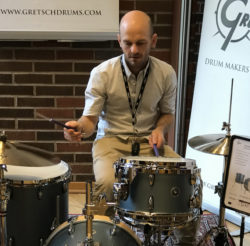I was a very fortunate eleven-year-old American in the mid-80s. I had lifestyle guidance from my older brother Richie, who had just dyed his hair jet black and played bass in a band with the cool kids. Richie rarely talked to me at the time, but I watched him and learned as little brothers do. Musically he would let me play drums with his musician friends every now and then and he introduced me to such forward thinking albums like the Cure’s The Head on the Door and New Order’s Low-Life. His teachings were then further augmented by MTV’s original five VJs and the audiovisual universe they conveyed on a daily basis.
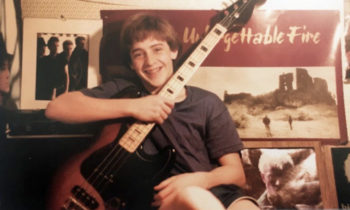 By January 1986, I, like the rest of the world, had watched a-ha’s Take On Me video and had been completely enamored by the story line, the panic of being chased by Nazi-like bad guys, and the fight for love! However, it was the wall of sound and visuals of a-ha’s second video The Sun Always Shines on TV that really closed the deal for me. A clean sequel of the Take On Me video, beginning with the same boy and girl and a sad ballad style, but then exploding into something so distinctively transcendent, with Morten Harket’s soaring vocals as the band performs its triumphant masterpiece to a crowd of mannequins in a Victorian Gothic church.
By January 1986, I, like the rest of the world, had watched a-ha’s Take On Me video and had been completely enamored by the story line, the panic of being chased by Nazi-like bad guys, and the fight for love! However, it was the wall of sound and visuals of a-ha’s second video The Sun Always Shines on TV that really closed the deal for me. A clean sequel of the Take On Me video, beginning with the same boy and girl and a sad ballad style, but then exploding into something so distinctively transcendent, with Morten Harket’s soaring vocals as the band performs its triumphant masterpiece to a crowd of mannequins in a Victorian Gothic church.
At the same time halfway around the globe in Norway, an ambitious 14-year old Karl Oluf was listening to the same song with his friends in his room and pledged to them that one day he was going to be such a good drummer that a-ha was going to call him and ask him to join their band. His friends probably rolled their eyes at the time, but little did they know that in 2009 that phone call would actually come.
I met one-on-one with Karl Oluf in Norway to talk about his career with a-ha, what it’s like to play the big stage, and the importance of working out of love.
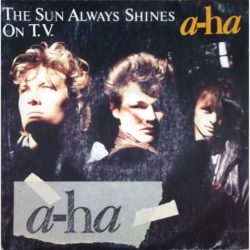 Lucas: In 2016, Morten, Magne, and Pal of a-ha were knighted by King Harald V of Norway for their services to Norwegian music and their international success. Is it difficult for backing musicians such as yourself to establish a healthy working relationship with front figures that are so immortalized by society? Could you ever say to one of them during the sound check that what they are playing or the riff they are trying to develop just flat out doesn’t sound good?
Lucas: In 2016, Morten, Magne, and Pal of a-ha were knighted by King Harald V of Norway for their services to Norwegian music and their international success. Is it difficult for backing musicians such as yourself to establish a healthy working relationship with front figures that are so immortalized by society? Could you ever say to one of them during the sound check that what they are playing or the riff they are trying to develop just flat out doesn’t sound good?
Karl Oluf: You may become friends to a degree, but you need to establish a trusting relationship first and foremost. A principle artist has to trust that you will take care of your job, so there absolutely has to be trust. Regarding sounding good or not, there are different situations. If we are in a studio situation and we are searching for gold, then I feel everyone involved more or less is equal and can come with suggestions that may or may not be approved. At the same time, some of the principle artists might have an idea that I could help bring to life. When rehearsing for a new approach or arrangement before a live performance, I feel free to play from my instincts. As a drummer I can guide or be guided. In this kind of setting most people are open-minded. I can come with suggestions for sure. However, when a song is done and it is given to me, that’s a very different situation. It’s all about the song and the melody, and if you’re not playing the song, then you are more or less out. You have to fit in to the mood of the song.
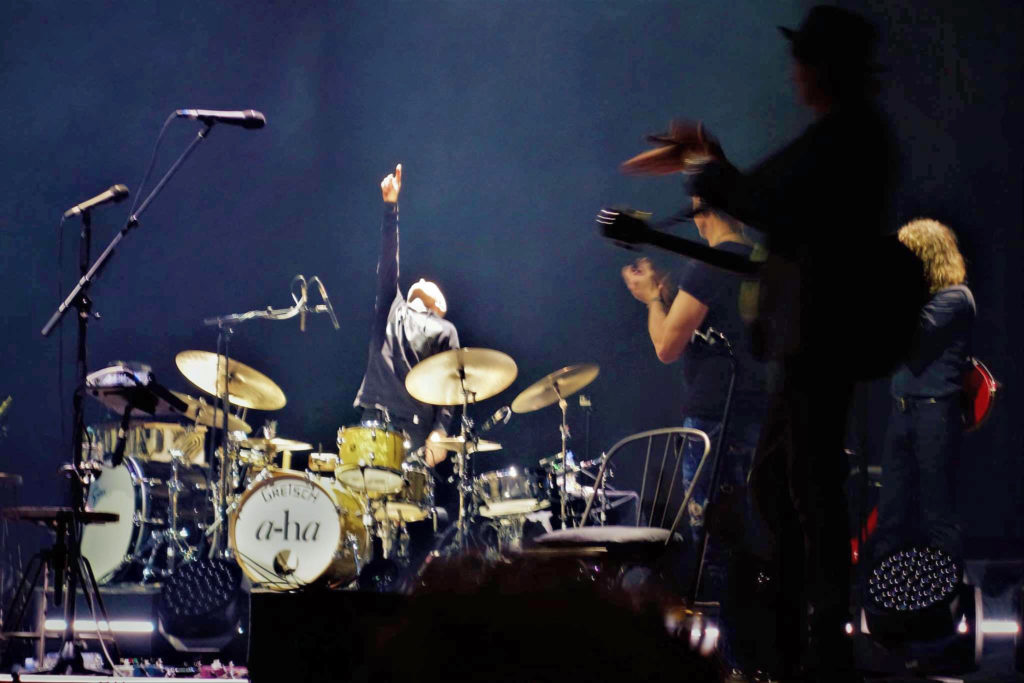
Lucas: When you are in a studio situation in an interactive environment with a-ha, do you feel like you can lead and take them in a direction and they will follow you?
Karl Oluf: Yes, actually I do.
Lucas: That must be very empowering.
Karl Oluf: I see it differently actually. For me, music is love. If I can open up there will be more love. That’s how I see it. So, if I have been pushing a good idea in a natural way, then people will follow. But if I try to force it then that’s a different story. I honestly believe that music is love or God or Allah or whatever you say love is. It goes extremely deep. It’s not just about learning to master a groove or a tempo or a sound, I have to be ALL-IN.
Lucas: Are you religious?
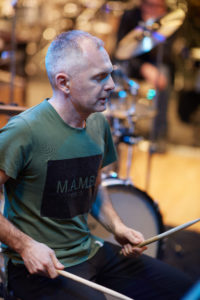 Karl Oluf: Yes, I see myself as a believer in Jesus. I am quite open-minded, but I find it to be like an anchor that I can hold onto when I feel lost.
Karl Oluf: Yes, I see myself as a believer in Jesus. I am quite open-minded, but I find it to be like an anchor that I can hold onto when I feel lost.
Lucas: When I hear Morten Harket speak he strikes me as being highly intelligent.
Karl Oluf: He is extremely intelligent and gifted in many ways. He can also drift a little mentally and is a bit of a daydreamer, but when he is focused and really into it, it is fascinating to be around. He can pinpoint exactly what you are looking for.
Lucas: Do you mean in conversation or when he sings?
Karl Oluf: In conversation. When I first started playing with a-ha I was perhaps trying too hard in a way, because I was lacking self-confidence. He then told me after a show, he said “You have to trust that you have the energy inside you, don’t let it go. Keep it inside, then you can ride it – like a horse.” I realized that what he meant was that if I didn’t get a hold of the energy, then it was just sound and had nothing to do with love. It’s more about fear. Fear of not being good enough.
Lucas: So when Morten told you about keeping the energy inside of you and riding it, did you notice the very next night that your approach to playing was different?
Karl Oluf: I agreed immediately with what he was saying. It hit the spot. I wasn’t hurt, I was uplifted. My lack of self-esteem was getting in the way of love.
Lucas: So you were working out of fear and not working out of love?
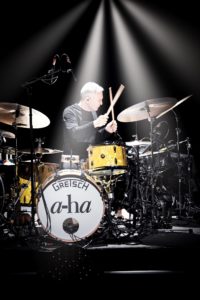 Karl Oluf: Exactly! I think it’s important that you try to remember why you are doing something. When I was a kid playing the drums I would completely lose myself in them. I would lose my sense of time and not know where I was anymore. I could start crying or start feeling uplifted when I played drums. I just wanted to be, and I should never ever lose that. Then I became older and thought “I’m gonna play with a-ha one day” and my neighbors and friends started questioning my career decisions and then I started questioning whether or not I was good enough, and that was when the fear started seeping in. It’s extremely important that we as humans are not driven by fear, but by love.
Karl Oluf: Exactly! I think it’s important that you try to remember why you are doing something. When I was a kid playing the drums I would completely lose myself in them. I would lose my sense of time and not know where I was anymore. I could start crying or start feeling uplifted when I played drums. I just wanted to be, and I should never ever lose that. Then I became older and thought “I’m gonna play with a-ha one day” and my neighbors and friends started questioning my career decisions and then I started questioning whether or not I was good enough, and that was when the fear started seeping in. It’s extremely important that we as humans are not driven by fear, but by love.
Lucas: Turning to your teaching process. When you are not touring you also work as a music professor at the University of Agder in Norway. Let’s say you have a drummer like me come in, a very average hobby level guy, how would you go about building me up as a drummer?
Karl Oluf: You could see every drummer as a table top with four pillars holding it up. If the legs of the table are different heights, the table will not be flat and cannot properly function, it will be slanted and uneven. Each pillar represents an aspect of drumming that you have to master. Musicality, timing, coordination, and technique. Musicality is your ability to be creative, your unique sound, your approach. Coordination is how you can play using both arms and legs as one unit.
Lucas: You mean like playing in 3 with one hand, in 4 with another, and in 5 with your right foot and the high hat on 2 and 4?
Karl Oluf: Or just playing a straight up beat evenly for 5 minutes. Can you really do that evenly for 5 minutes?
Lucas: I’ve never tried!
Karl Oluf: It’s extremely important, because that is how you are going to pay your bills. As drummers we have to work on the coordination thing. We have to be able to play evenly for a longer period of time. Coordination is very highly linked to timing. If you have bad coordination, you might have bad timing. If you have bad timing, you probably don’t have good coordination either. Then we have technique. As a drummer you should develop technique that will get you closer to your instrument, but not only so that you can play faster. Fast is good, but slow and even is better. If you will make love to someone I guess you should be as close as possible to that someone. When I play my drums I think (at least sometimes) that I am making love with my instrument. Good technique brings me closer to my instrument. Another thing about technique is you should develop a good relationship between the drumsticks and the pedals with your arms and legs to avoid troubles with your muscles and tendons. You should rehearse until you find yourself relaxed in slow, medium, and fast tempos. Put a mirror in front of yourself while rehearsing and check if your motion looks relaxed and natural. And, the 40 rudiments have not hurt any drummers as far as I know.
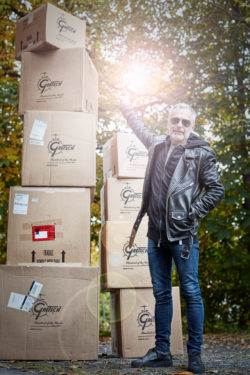 This all gives you a bird’s eye view of how you are as a drummer. Is your table of fundamentals even or do you need to work more on one of the four pillars of musicality, timing, coordination, and technique? When you are on stage and the heat is on, these skills are what is going to save you. When I start with a student I do an analysis of each of these pillars, and begin working on the pillar that is lacking the most. If the creativity just isn’t there then I try to give some instruction where I get them to do improvisational work.
This all gives you a bird’s eye view of how you are as a drummer. Is your table of fundamentals even or do you need to work more on one of the four pillars of musicality, timing, coordination, and technique? When you are on stage and the heat is on, these skills are what is going to save you. When I start with a student I do an analysis of each of these pillars, and begin working on the pillar that is lacking the most. If the creativity just isn’t there then I try to give some instruction where I get them to do improvisational work.
Lucas: As a drummer you have performed for many years now at the absolute top level with a-ha. What insights can you give your students that a normal music teacher who hasn’t performed at this level cannot give?
Karl Oluf: There is no secret. Everything comes out of nothing. The most promising seeds often never become anything. The most unpromising seeds can come into the right conditions and become beautiful flowers. There is no secret. You can either live your life thinking that everybody else other than you knows what the secret is, or you can live your life truly understanding that everything comes out of nothing. Let us be curious, let us see what can happen, let me try to dive into it, let’s see how we can develop, let’s see what we can achieve and create. This is a completely different approach than believing that there is some magical secret to success. Look I’ve been on the big stage so much, and I’ve definitely felt the heat. But for me it’s about love. I’m still in love with music. I don’t really think that I have any special insight.
Lucas: Your insight is that there is no insight.
Karl Oluf: Even on this level, there is no secret formula. When I was a kid I wanted to move to the states because I read in Modern Drummer about everything that was going on in America. I remember thinking “Wow, what is happening? Is there a secret? Is there something that I really don’t get because I am stuck here in Norway? I went to the US for 6 months living in New York. I was 26 and I heard Brian Blade at Smalls and I just realized that there is nothing else than love and passion for music. At the same time I also know what it takes to be on the big stage. I know about the amount of work that it takes to get there and stay there.
Lucas: I recently interviewed Gretsch artist Mark Schulman, the drummer for P!nk. He has written a book entitled “Conquering Life’s Stage Fright – Three Steps to Top Performance.” Did you struggle with stage fright as the audiences you were playing for grew larger and larger? How do you mentally prepare for a show?
Karl Oluf: I always get extremely tired before a show and I just want to sleep. I think it’s a focus thing. I read that Lions like to sleep before they attack and kill and eat. It’s the same with me. But regarding stage fright, again it’s about what is driving me. Am I trying to achieve something that I don’t want? Do I want to be somebody that I cannot be? Or do I just want a lot of people to look up to me? What’s driving me? If I am driven by LOVE, there is no stage fright. I feel very loved when I play the drums. The reason why I am here on this planet is to play drums. Hopefully people will watch me play and go home and continue their lives and love their kids and love their spouses and be what they can be. That is so important and fragile. When I am well prepared, then I just look forward to playing. If I am not well prepared, then its another story…
Lucas: Why do you play Gretsch drums?
Karl Oluf: From the dignified logo on the front head of the bass drum to the way they make me feel sitting behind the drums, Gretsch drums make me want to create.
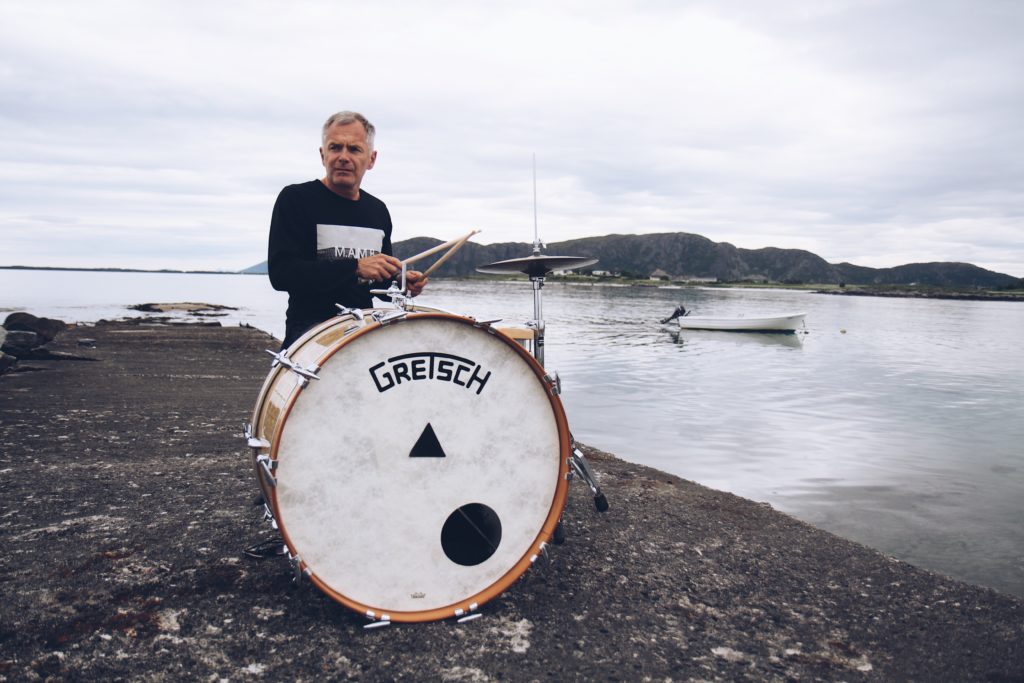
Lucas: What are your plans for 2018?
Karl Oluf: The a-ha unplugged tour has been very successful so I hope that will continue with gigs well into 2019. This summer a-ha is going electric again. I also want to continue teaching. So with both the teaching job at the University of Agder and a-ha I am very busy. It’s been many years now of just playing drums, so I would like to get back to songwriting if possible. It’s extremely important as an artist to not only copy, but to also create. It’s a good thing for my brain to be a creator. I’m also a husband and a father, so I would very much love to be with my family for a few days…
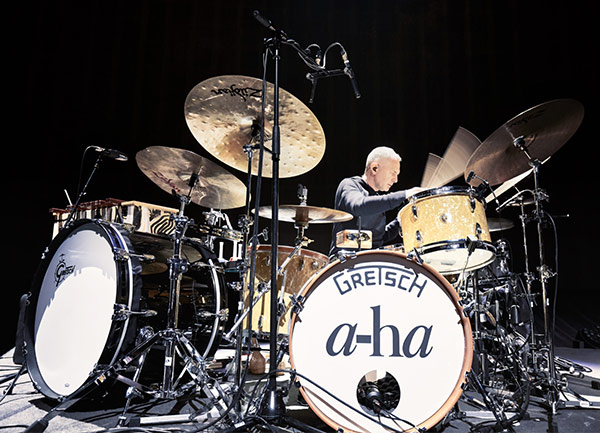
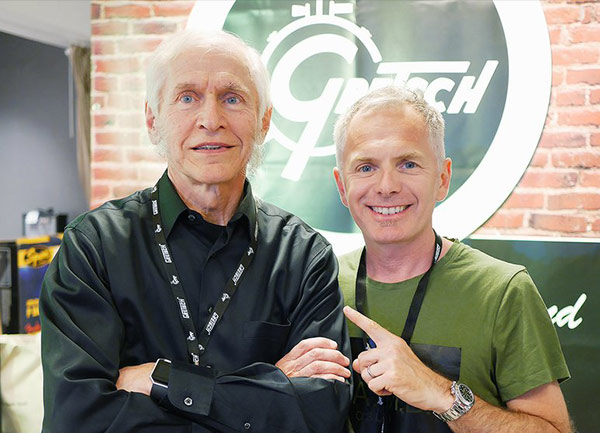
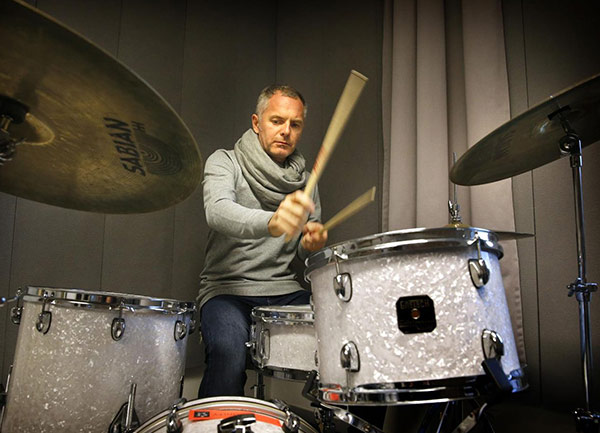
— Lucas O’Connor
(Gretsch Generation 5)
